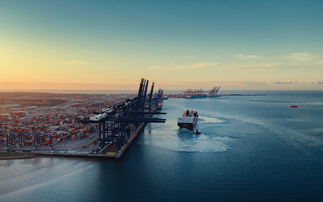Credit: iStock
New report from Wärtsilä calls for action from policymakers, industry, and individual shipping operators to accelerate production and uptake of sustainable fuels
Sustainable shipping fuels could reach cost parity with fossil fuels as early as 2035 with the help of ambitious policies such as carbon taxes and emissions limits for shipping operators, according to a new report released today by technology group Wärtsilä.
The report - titled Sustainable fuels for shipping by 2050 - the 3 key elements of success - predicts the EU Emissions Trading Scheme (ETS) and FuelEU Maritime Initiative (FEUM) will see the costs of shipping emissions more than double by 2030. The increase in carbon prices should mean that by 2035 the price gap between fossil fuels and sustainable shipping fuels should be closed for the first time, according to the report.
The report acknowledges that shipping is "the engine room of the global economy" and an efficient form of transporting goods. But it also highlights how the sector emits two per cent of global emissions - equivalent to the annual emissions of Japan - and without action shipping could account for more than 45 per cent of global emissions by 2050 as the industry expands and other sectors decarbonise.
In 2023, the International Maritime Organisation (IMO) set a target of achieving net zero carbon emissions by 2050. But the industry and regulators have faced fierce criticism from campaigners for failing to do enough to accelerate the development and adoption of clean technologies.
Wärtsilä suggested existing decarbonisation solutions such as fuel efficiency measures could cut up to 27 per cent of shipping emissions, and argued sustainable fuels will provide a "critical step" in eliminating the remaining 73 per cent, but it warned "radical action" is needed to scale up the production of low and zero carbon fuels.
It said the industry is facing a "chicken and egg" challenge, where ship owners will not commit to a fuel today which is expensive and only produced in small quantities, and may be usurped by another fuel which scales faster and proves more affordable.
A range of low and zero emission fuels are under development, including biofuels, hydrogen, ammonia, and various e-fuels. However, it is proving difficult for suppliers of new fuels to scale up production without clear long term demand signals from shipping operators.
Wärtsilä said it produced its new modelling to provide a timeline on how greener fuels could be delivered at global scale and affordable cost.
To accelerate the timeline, the report argued decisive policy interventions, industry collaboration, and individual operator action must coalesce to boost production of sustainable fuels.
"Achieving net zero in shipping by 2050 will require all the tools in the toolbox, including sustainable fuels," said Roger Holm, president of Wärtsilä Marine & Executive Vice President at Wärtsilä Corporation. "As an industry, we must focus on coordinating action across policymakers, industry and individual operators to bring about the broad system change required to quickly and affordably produce a mix of sustainable fuels. Policy in Europe is showing just how impactful action at the international level can be, closing the cost gap between fossil- and low-carbon fuels for the first time."
According to Wärtsilä's modelling, sustainable fuels will be three to five times more expensive than today's fossil fuels by 2030.
But it predicts the ETS and FEUM will prove key in closing the price gap. As such, the report argues that policymakers should set an internationally agreed science-based pathway for phasing out fossil fuels from the marine sector, in line with IMO targets.
It also argues the sector should adopt a global industry standard for marine fuel carbon pricing, as well increasing global collaboration between governments to catalyse the innovation and infrastructure necessary to deliver sustainable fuels at scale worldwide.
And it suggests shipping firms should convene with leaders in aviation, heavy transport, and industry to establish a globally recognised framework for the production and allocation of sustainable fuels.
In addition, it calls for the establishment of an industry-wide knowledge hub for the purpose of sharing expertise, skills, and insights on sustainable fuel adoption.
The report also highlights how rising carbon prices could strengthen the business case for investing in fuel efficiency measures. Every Euro an operator saves in fuel costs at today's prices could be worth three to five times as much by 2030, the report predicts. It says this means companies such as Carnival Corporation, which made a five to 10 per cent efficiency gains through its Service Power Upgrade Program could cut its fleet wide fuel costs by as much as $70m per year in 2030.
As such, it argues all operators can benefit from improving the efficiency of their vessels, with the technology readily available today.
"If there is one take away from our report, it is that smaller operators need not feel powerless," said Holm. "They have a major role in accelerating towards net-zero emissions shipping. Taking steps to improve fuel efficiency and invest in fuel flexibility can deliver immediate returns, reducing both emissions and operating costs. But action must be swift - we have the lifecycle of just a single vessel to get this right."
Could you or a colleague be recognised at the inaugural Women in Green Business Awards? You can submit your nominations for the awards now.







